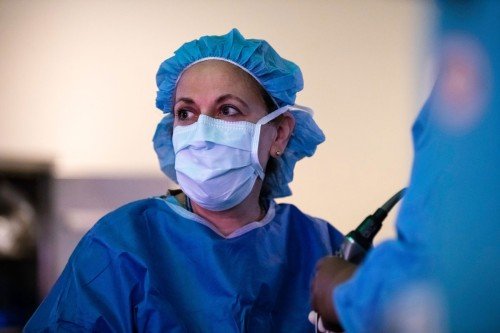
Police officer Randy Reif was trained to handle almost any situation. But nothing could have prepared him for the fight of his life.
Randy woke up one day in October 2021 feeling lightheaded. He also noticed changes in his vision. Before long, Randy was on the floor, having a seizure. An ambulance rushed him to a hospital near his home on Long Island.
Doctors thought the issue was with Randy’s heart or blood pressure. But when a battery of tests came back normal, they discharged him and recommended that he see a neurologist. The doctor ordered an MRI of his brain, and the results were shocking: Randy had a tumor in the front part of his temporal lobe, a part of the brain that regulates emotion and behavior. The shape was complex, altogether the size of a golf ball.
“I went to the worst-case scenario,” recalls the 49-year-old father of two. “I thought, ‘This is the end of your story.’ ”
But it wasn’t. In fact, it was the start of a new chapter — one Randy would later call his “greatest victory.”
‘The Yankees of Cancer Treatment’
After consulting with a local neurosurgeon, Randy opted for a second opinion at Memorial Sloan Kettering Cancer Center. The local surgeon supported that decision. “Almost everybody in my life recommended I do that,” he says. “I’m a Yankees fan, and everybody said I needed to go to the Yankees of cancer treatment.”
Randy felt at ease during his first meeting with MSK neurosurgeon Nelson Moss. Based on Randy’s scans, Dr. Moss thought the tumor was benign. It was on the right side of his brain and considered “silent” because it didn’t affect Randy’s speech or mobility. It was possible that Randy had had the tumors for years without realizing it. The seizure tipped the scales.
“A first-time seizure in an adult is not normal and should always be checked out immediately,” Dr. Moss says. “We saw that Randy had a slow-growing tumor that was very deep,” Dr. Moss says.
Even though the tumor did not look cancerous, Dr. Moss and his team knew how to handle it. Randy had a choice: He could have surgery to remove the tumor, or be monitored by Dr. Moss to make sure it didn’t grow. If Randy had surgery, a pathologist — a doctor who analyzes cancer tissue under a microscope — could diagnose the exact type of tumor Randy had. The operation also had the potential to stop him from having another seizure. Randy decided that surgery was right for him.
“The way Dr. Moss explained it, I went from ‘My life is over’ to ‘This is possibly going to be my most triumphant hour,’ ” Randy says. “I felt empowered. I told him, ‘You’re my guy.’ ”
Dr. Moss, too, was very confident he could help Randy.
“Patients are our most important partners,” he says, “and Randy was positive, upbeat, and ready to treat this surgically.”
Unparalleled Excellence
The specialists who cared for Randy — from pre- and postoperative nurses to everyone in the operating room — solely care for people with brain tumors. That kind of expertise is a hallmark of being treated at MSK, says Dr. Moss.
“Our entire team exclusively takes care of patients like Randy,” he says. “We’re a very experienced, compassionate, understanding team focused on the needs of the patient. We can anticipate questions and concerns and help patients do really well during recovery.”
On December 6, 2021, Dr. Moss and his team removed the entire tumor in a three-hour surgery. MSK neuropathologist Marc Rosenblum had the tumor analyzed through MSK-IMPACT™, a test that looks for more than 400 genes known to cause cancer. Dr. Rosenblum confirmed that the tumor was not cancer; it was a slow-growing and less serious tumor called a dysembryoplastic neuroepithelial tumor.
The MSK-IMPACT results did reveal a genetic anomaly that has the potential to cause cancer. As a result, Randy’s care team keeps a close watch to make sure nothing changes, and they remain very optimistic about his long-term cure.
Randy healed so well that he was discharged just two days post-operation instead of the standard three. He attributes his quick recovery to MSK’s expertise as well as its team approach to making sure his needs were met. “I received phenomenal treatment from the moment I entered until the moment I left,” he says.
A Message of Hope
Three weeks after surgery, Randy had a follow-up appointment with Dr. Moss. Dr. Moss says he does not expect Randy will need any follow-up surgeries. Randy plans to return to work on March 1, 2022.
“A lot of my co-workers were shocked,” he says. “But when you get treated by the best, you recover quicker.”
As he suits up for the line of duty again, Randy has a message for anyone who finds themselves in a position like his: “This is not going to be a tragic tale in your story.”
Of course, Dr. Moss understands the anxiety of a visit with a neurosurgeon. But patients like Randy, he says, can inspire others at the start of their journey.
“Half of the people in our waiting room are post-operation,” says Dr. Moss, adding that waiting rooms have gone mostly virtual due to the pandemic. “I wish I could introduce them to those awaiting surgery, to show them that there is hope.”




